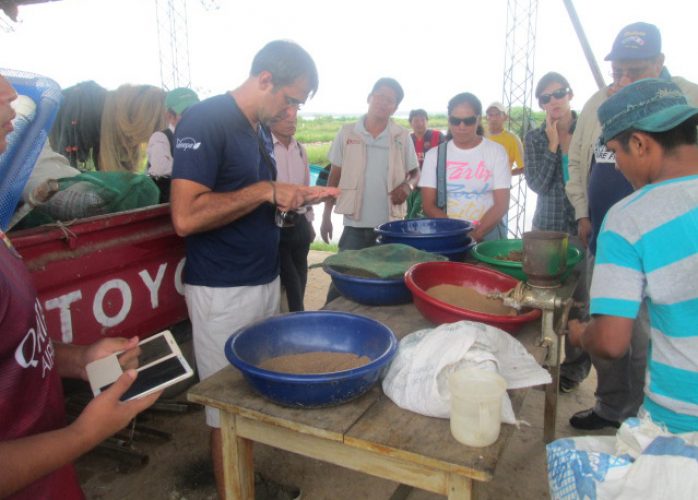During his visit to Bolivia from January 10 to 31, 2016, Dr. Luiz Eduardo de Freitas, expert in fish feeding and nutrition from the Brazilian Agricultural Research Company (EMBRAPA), emphasized the importance of water management and fish feeding.
During his visit to Bolivia from January 10 to 31, 2016, Dr. Luiz Eduardo de Freitas, expert in fish feeding and nutrition from the Brazilian Agricultural Research Company (EMBRAPA), emphasized the importance of water management and fish feeding.
Dr. Freitas was pleased with the fish farming carried out in the Amazon Basin of Bolivia, since people show a lot of enthusiasm and are “doing what they can with what they have.” He identified that the activity is entering a critical stage due to the deterioration of water quality in the ponds and that this will generate new problems and, without a doubt, losses for fish farmers.
The balanced food available is not the best. However, the expert states that “a lot can be improved by modifying a few things.” Producer families can demand improvement in quality and take advantage of the collaborations generated by the Fish for Life II Project through the construction of platforms (“dialogue tables”) with the owners of food factories.
Participating in the Fish Nutrition and Feeding module of the Auxiliary Fish Farming Technician course of the Comprehensive Faculty of Ichilo (UAGRM), Dr. de Freitas explained to the 38 technicians and leading producers that “good water management It also consists of good food management. If the fish do not consume the ration within 20 minutes, the food must be removed from the pond to prevent it from sinking and contaminating the water.”
Dr. de Freitas accompanied the Fish for Life II team in its strategic meetings with institutions such as CAOR, SENASAG, IPD PACU and HOYAM to seek links and opportunities for collaboration. The development of fish farming activity depends on the entire production chain that includes producers, traders (of inputs, fingerlings, feed and equipment) and related support institutions that can provide technological and governmental support.
In this period of visits and exchanges, Dr. de Freitas was able to identify certain problems and opportunities from which he certifies, in conclusion, that: “the potential for fish farming in Bolivia is very great, it is all a matter of time for it to be realized.” become one of the countries with the highest fish production in South America, but for this to be possible, it is important that the government thinks about policies for both family producers and also for large and medium-sized businessmen.”
Brazil has a lot of experience in tropical fish farming, which presents a great opportunity to take advantage of its lessons learned and thus assertively develop the tropical fish farming sector in Bolivia.
| Thanks to WFT's coordination with EMBRAPA, Dr. de Freitas is the second Brazilian fish farming specialist to visit Bolivia with Fish for Life II. Their experience was put at the service of Bolivian fish farmers to respond to a series of problems identified in a participatory manner by Dr. Paulo C. Cecarelli of ICMBio in June 2015. (link: http://www.pecesvida.org/avances/piscícola/factores-criticos-internos-en-piscícola-tropical text: See Internal Critical Factors in Piscculture) |
Contacts:
Widen Abastofor, CEPAC, widen@cepac.org.bo
Tiffanie Rainville, WFT, anie@worldfish.org
Álvaro Céspedes, IMG, lorcespedes@gmail.com

